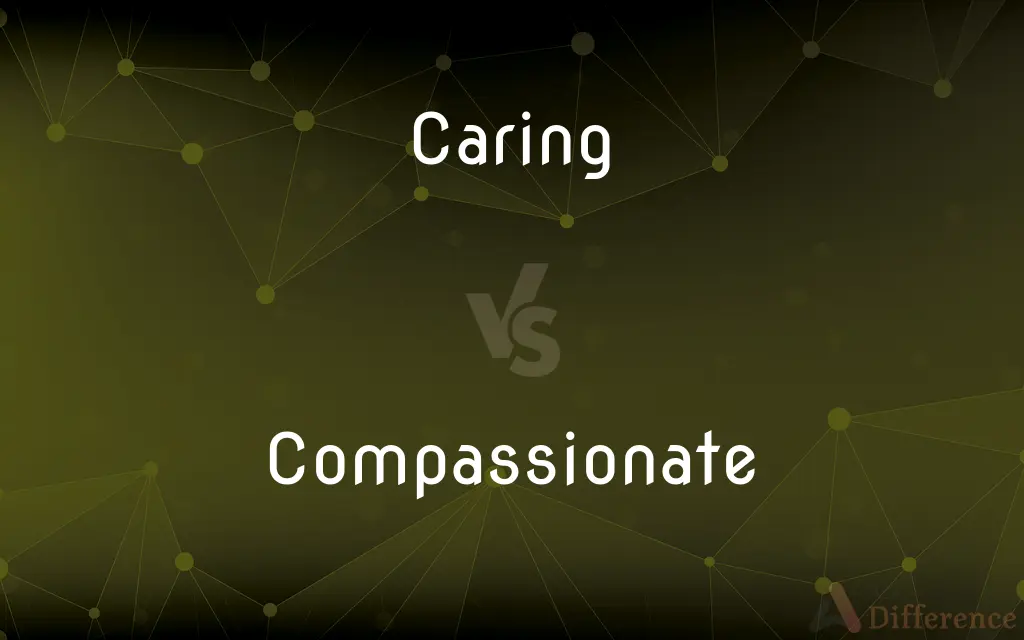Caring vs. Compassionate — What's the Difference?
Edited by Tayyaba Rehman — By Fiza Rafique — Updated on March 26, 2024
Caring involves providing support and kindness to others' needs, while compassion entails deep empathy and a desire to alleviate someone's suffering.

Difference Between Caring and Compassionate
Table of Contents
ADVERTISEMENT
Key Differences
Caring is an action or behavior that demonstrates concern and support for the needs of others, often involving physical acts of help or emotional support. It's a broad term that encompasses a variety of supportive actions, from helping a friend in need to caregiving roles. Compassion, on the other hand, goes beyond mere caring by embodying a deeper level of empathy and understanding towards another's suffering, coupled with a strong desire to alleviate that suffering. Compassion involves feeling for another person and is often motivated by a profound sense of shared humanity and understanding of pain.
While caring actions can be seen in everyday gestures and responsibilities, compassion involves a deeper emotional connection, where one not only recognizes another's pain but also feels motivated to help ease that pain. For instance, a caregiver may provide care out of duty or professional responsibility, but compassion involves a heartfelt desire to improve the other person's situation out of genuine concern for their wellbeing.
The difference also lies in the depth of emotional engagement. Caring can be more surface-level, involving actions that support well-being, such as providing meals or offering a listening ear. Compassion digs deeper, requiring one to truly feel with the person who is suffering, which can lead to more profound acts of kindness and support, driven by a deep understanding of and empathy for the person's condition.
Compassion is often associated with a sense of altruism and selflessness, where the compassionate individual may go out of their way to help, even at a personal cost. In contrast, caring, while important and valuable, does not necessarily involve this deeper emotional or empathetic connection.
Understanding the nuances between caring and compassion is essential, as both play vital roles in human relationships and society. While caring provides the necessary support and assistance people need, compassion brings a depth of empathy and understanding that can transform both the giver and receiver, fostering a deeper connection and humanity. Compassion, in essence, can be seen as an extension of caring, imbued with deeper empathy and a commitment to alleviating suffering wherever it's found.
ADVERTISEMENT
Comparison Chart
Definition
Showing concern and support for the needs of others
Deep empathy for another's suffering and a desire to alleviate it
Emotional Depth
Involves supportive actions, possibly with emotional engagement
Requires deep emotional connection and understanding
Motivation
Can be out of duty, responsibility, or affection
Driven by profound empathy and the desire to ease suffering
Actions Involved
Providing help, support, listening, and nurturing
Going beyond basic care to address deeper suffering
Outcome
Meets immediate needs and provides comfort
Aims to understand and alleviate suffering on a deeper level
Example
Making meals for a sick neighbor
Working in a disaster area to help victims rebuild their lives
Compare with Definitions
Caring
Can be motivated by various factors, including duty or affection.
The community's caring response to the family's tragedy was overwhelming.
Compassionate
Involves a deep emotional understanding of another's pain.
The doctor's compassionate demeanor made it easier for patients to discuss their fears.
Caring
Often demonstrated through practical actions to meet another's needs.
He spent weekends caring for his aging parents, ensuring they were comfortable.
Compassionate
Driven by a desire to alleviate suffering.
Compassionate individuals often volunteer in areas hit by natural disasters.
Caring
Essential for maintaining relationships and social bonds.
Caring for each other's well-being strengthens the bond between friends.
Compassionate
May involve selfless acts to help others.
Offering a place to stay for a friend in crisis is a compassionate act.
Caring
The act of showing concern and providing support or assistance to others.
Her caring nature made her everyone's confidante.
Compassionate
Transforms understanding and connection between individuals.
Compassionate listening can bridge differences and heal divisions.
Caring
Provides immediate comfort and meets basic needs.
The teacher's caring approach helped the new student adjust to the school.
Compassionate
Feeling or showing sympathy and concern for the sufferings or misfortunes of others.
Her compassionate words brought solace to those in grief.
Caring
Displaying kindness and concern for others
A caring and invaluable friend
Compassionate
Feeling or showing sympathy and concern for others
I allowed him to go home on compassionate grounds
She tried to sound compassionate
Caring
The work or practice of looking after those unable to care for themselves, especially on account of age or illness
The caring professions
Compassionate
Feeling or showing compassion; sympathetic.
Caring
Feeling and exhibiting concern and empathy for others.
Compassionate
Granted to an individual because of an emergency or other unusual circumstances
Compassionate military leave.
Caring
(of a person) Kind, sensitive, or empathetic.
She's a very caring person; she always has a kind word for everyone.
Compassionate
To pity.
Caring
Present participle of care
Compassionate
Having, feeling or showing compassion (to or toward someone).
Caring
The act of one who cares.
Compassionate
Given to someone as an exception because of a family emergency or a death in their family.
Compassionate leave; a compassionate visa
Caring
A loving feeling
Compassionate
(obsolete) Inviting or asking for pity.
Caring
Showing a care;
A caring mother
Compassionate
To feel compassion (for someone or with regard to something); to regard (someone or something) with compassion.
Caring
Having or displaying warmth or affection;
Affectionate children
Caring parents
A fond embrace
Fond of his nephew
A tender glance
A warm embrace
Compassionate
Having a temper or disposition to pity; sympathetic; merciful.
There never was any heart truly great and generous, that was not also tender and compassionate.
Caring
Feeling and exhibiting concern and empathy for others;
Caring friends
Compassionate
Complaining; inviting pity; pitiable.
Compassionate
To have compassion for; to pity; to commiserate; to sympathize with.
Compassionates my pains, and pities me.
Compassionate
Share the suffering of
Compassionate
Showing merciful compassion;
Sparing the child's mother was a compassionate act
Compassionate
Showing or having compassion;
Heard the soft and compassionate voices of women
Compassionate
Showing recognition of unusually distressful circumstances;
Compassionate leave
Considered for a compassionate discharge because of domestic difficulties
Common Curiosities
Can caring turn into compassion?
Yes, caring actions can deepen into compassion as one develops a deeper emotional understanding and connection with the needs and sufferings of others.
How do you develop compassion?
Developing compassion involves cultivating empathy, understanding, and an open heart through mindfulness, listening, and putting oneself in another's shoes to truly grasp their suffering.
Can a person be caring but not compassionate?
Yes, someone might perform caring actions out of duty or obligation without necessarily feeling deep empathy or a strong desire to alleviate suffering, which are hallmarks of compassion.
Is it possible to be compassionate without caring actions?
Compassion inherently involves a desire to take action to alleviate suffering, so it is difficult to be truly compassionate without demonstrating caring actions, even if those actions are emotional support rather than physical aid.
How can teaching compassion impact children?
Teaching children about compassion can help them develop empathy, improve their social skills, and encourage a lifelong commitment to helping others and making positive changes in their communities.
How does practicing compassion benefit the individual?
Practicing compassion can lead to increased happiness, reduced stress, and a sense of fulfillment from helping others, enhancing one's overall well-being and perspective on life.
Why is compassion important in society?
Compassion is crucial for fostering social harmony, understanding, and cooperation. It drives humanitarian efforts, encourages selflessness, and helps alleviate suffering on individual and collective levels.
Is there a limit to compassion?
While compassion is a virtue, individuals must also practice self-care and set boundaries to avoid compassion fatigue, especially in professions involving frequent exposure to others' suffering.
How do professionals balance caring and compassion in their roles?
Professionals, such as healthcare workers, balance caring and compassion by providing necessary support and assistance (caring) while also engaging with patients or clients on a deeper emotional level to understand and alleviate their suffering (compassion), often within the boundaries of professional detachment.
What role does empathy play in compassion?
Empathy is a foundational element of compassion, as it involves understanding and sharing the feelings of another, which motivates compassionate thoughts and actions.
Share Your Discovery

Previous Comparison
Focused vs. Focusing
Next Comparison
Parameter vs. EstimatorAuthor Spotlight
Written by
Fiza RafiqueFiza Rafique is a skilled content writer at AskDifference.com, where she meticulously refines and enhances written pieces. Drawing from her vast editorial expertise, Fiza ensures clarity, accuracy, and precision in every article. Passionate about language, she continually seeks to elevate the quality of content for readers worldwide.
Edited by
Tayyaba RehmanTayyaba Rehman is a distinguished writer, currently serving as a primary contributor to askdifference.com. As a researcher in semantics and etymology, Tayyaba's passion for the complexity of languages and their distinctions has found a perfect home on the platform. Tayyaba delves into the intricacies of language, distinguishing between commonly confused words and phrases, thereby providing clarity for readers worldwide.















































